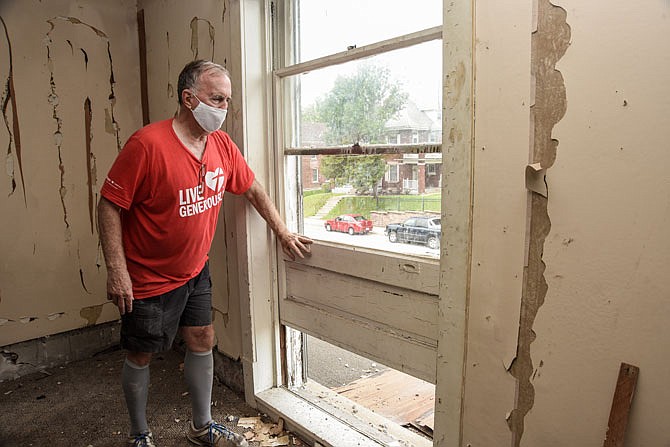An idea had percolated in the community for a while.
What, Mark Kiekhaefer asked, would it take for a nonprofit to offer below-market-cost rentals to clients and help people get on their feet?
Kiekhaefer, pastor at Living Hope Church, and other church leaders sought an outside-the-box idea to some of the housing issues that ail Jefferson City.
"The genesis of it was that (about the same time as) the tornado, a group of us gathered to discuss the issue of transitional housing," he said. "It involved a bunch of churches and organizations."
They developed a nonprofit called Transformational Housing, whose slogan is "Where love for community meets hope and healing."
The May 2019 tornado heavily damaged or destroyed more than 150 housing units within the city. About 70 percent of the people it displaced were renters. Many were low-income renters.
Even before the storm, the rental housing market was woefully short within Jefferson City, leaders said.
Story continues below video.
While searching for a unique solution to the housing problem before the tornado, the idea to model a program after Habitat for Humanity evolved - but instead of a focus on home ownership, the program would be focused on rental property.
The new organization wants to work closely with Common Ground Community Building - which provides relationship-focused approaches to addressing needs of clients in poverty - and with River City Habitat For Humanity. Common Ground developed from a ministry of downtown Jefferson City churches into an independent nonprofit that offers solutions surrounding homelessness.
"We want a building that can have apartment units, where (clients) can have stable housing," Kiekhaefer said. "We don't know exactly what that all will look like. We're trying to learn."
Transformational Housing organizers looked at a program in Columbia, where Compass Evangelical Free Church bought a single-family home about six years ago to use as transitional housing, Kiekhaefer said. The family must be enrolled in specific Love INC programs. Love INC is a nonprofit that, much like Common Ground, provides resources to help people overcome poverty.
The house is provided to the family for four to six months. During that time, Love INC coaches the family to set goals, create stability and save resources needed to move into permanent housing, according to compassefc.com.
But the Jefferson City organization was uncertain how the model might be duplicated here.
About two weeks after the tornado, a member of Common Ground's board of directors contacted Kiekhaefer.
A kitchen fire had started in an apartment building that the tornado had not damaged at 203 Cherry St. Emergency personnel evacuated the building, but the owner didn't want to rebuild. It's been vacant since.
"We got in touch with the owner," Kiekhaefer said. "He didn't have the desire or intention to do the rehab again."
So the group formed a nonprofit and, after the U.S. Internal Revenue Service recognized the organization, took possession of the house.
Several weeks ago, volunteers began demolition on the house - taking it down to its bare bones.
It may be possible to offer several rental units at the house, said John Blosser, a Jefferson City native who is on the Transformational Housing board of directors.
Blosser, who attends First Christian Church and helps build homes for River City Habitat for Humanity, is among the leaders of the effort to rebuild the apartment building.
Pastors realized churches in town had an opportunity to step up and fill the need for affordable housing in Jefferson City, Blosser said.
"Habitat's done a fantastic job of addressing housing for people who are ready to step into home ownership," he said. "But most of what got destroyed by the tornado - the vast majority - was not owner-occupied. It was rental."
The group was most interested in trying to address the need for low-income rentals, he continued.
The board for River City Habitat for Humanity agreed Transformational Housing would be a good organization to partner with, according to Susan Cook-Williams, executive director of the local Habitat.
So Habitat for Humanity helped Transformational Housing obtain the Cherry Street property.
"We're all going to have to work together to overcome the housing crisis," Cook-Williams said. "It will take more than home buyers to make a dent."
The owner of the Cherry Street building needed a nonprofit to turn it over to, but Transformational Housing hadn't been formalized. Habitat accepted the property then transferred it to the new nonprofit after it received nonprofit status.
It may take more than two years to prepare the apartments for renters, Blosser said.
The plan is to provide housing for the client families at below-market rent. There is a huge need for low-income housing, Kiekhaefer said.
The nonprofit will charge rent but not enough to make a profit, he said. The rent could be enough to support the property.
"We want it to be self-sustaining," he continued. "Hopefully, people will be paying rent, so ongoing expenses will be covered."
More information about the new nonprofit, including how to volunteer to help or how to make donations, may be found at transformationalhousing.org.

